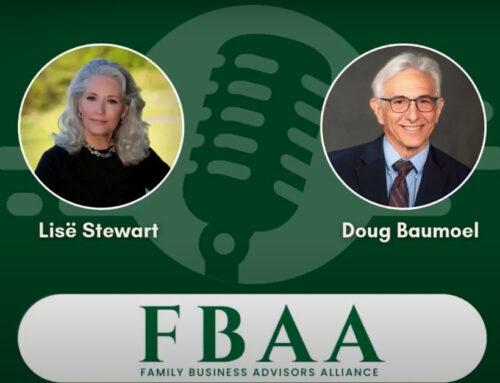“The family — that dear octopus from whose tentacles we never quite escape, nor, in our inmost hearts, ever quite wish to.” ~~Dodie Smith
Continued Relations
Unlike classic business disputes where warring parties can do battle, inflict fatal wounds and walk away from each other, in a family enterprise this just isn’t possible, nor desirable in most situations. And it’s true even when the individual(s) at the heart of the conflict seemingly doesn’t care about their relationship any longer. In time, they ultimately agree that they’re part of “something bigger” and breaking these ties would be devastating and far-reaching. The severing ties scenario could affect many other family members – even those only tangentially involved, like children and grandchildren. We would characterize the preservation of these relationships as ‘continuing relations’.
Such a conflict in a family business presents unique challenges as well as an opportunity for the role of the ‘The Conflict Manager’. The responsibility of this designation is to help stakeholders explore and understand the range of conflict management options available. As well as explain each option’s likely effect on the entire family business system. The Conflict Manager, above all, needs to understand the specific nature of the conflict be it over wealth, power or the business itself.
The Good News
Family members are highly-motivated in learning to manage conflict better in order to remain a “family”. They may be more willing to compromise or go the extra mile to maintain the ‘family’. They often bring a deep understanding of each other and a shared history to the table, as well as the desire to create new and positive stories. There are shared family strengths, values, humor, love of sports or the arts or even reunion traditions that can be capitalized upon to build momentum.
The Bad News
Family members in conflict will often experience certain challenges just because of their family connections. The same high stakes mentioned above can squelch honest discussion, causing people to bury resentment for prolonged periods. This often discourages family members to avoid dealing with serious problems. They’re afraid of dividing the family or hurting their nearest and dearest. Sometimes, families get stuck in these patterns which prevents true understanding of what is really going on. Family meetings and discussions can devolve into screaming matches of an intensity that we would rarely see in other boardrooms.
The Conflict Manager and the Family Factor
In working with the family enterprise, Conflict Managers must be prepared to assess, enhance and support healthy continuing relationships throughout the conflict management process. At Continuity, we have many methods for doing so including assessing the “The Family Factor”.
The Family Factor is a component of our Conflict Equation, which measures the strength of the family bond and its ability to leverage compromise and a commitment to change. If stakeholders are willing to compromise and to change their behaviors to preserve and strengthen their family bonds, then the family’s ability to manage conflict is greater. Conversely, if they’re not willing to sacrifice or compromise for the sake of being family, managing conflict will be far more difficult.
Shared History, Shared Vision and Trust
The ‘Family Factor’ is composed of three key components:
- 1. A SHARED HISTORY
-
- A family that shares a robust and positive history together is likely to have a high Family Factor. This is, in part, because they have a solid foundation of positive memories and experiences together. This serves to keep them naturally more aligned in their goals and values making poorly-managed conflict less likely. They realize that those fond memories of each other would be at risk and forever tarnished by festering conflicts.
Having a strong, positive shared history among family members is one of the most important protections against debilitating conflict.
-
- Sometimes families have difficult histories to contend with. They may have been challenged by substance abuse, bad behavior, messy divorces, bankruptcies, or tragic incidents and simply may not have many happy memories as family. But, to the extent that they have pulled together in adversity, they may have built a strong Family Factor despite these challenges (or maybe because of these challenges).
- 2. A SHARED VISION OF BEING FAMILY IN THE FUTURE
-
-
- Having a shared vision of being family in the future speaks to whether family members believe they will remain connected over time. Sometimes a family enterprise or shared wealth plays a central role in defining how families will preserve the family bond through succeeding generations. When a family business, or their philanthropic commitment serves as a focus for well-articulated family values, it creates a structure for keeping family members connected. They have a concrete vision of what “family” will mean in the future and how important it is to their identity.
-
- Additionally, when family members share hobbies, core values and reunion traditions, they may simply enjoy being together and make time to continue getting together. Families of musicians, skiers, baseball fans and those who share religious or political beliefs may find camaraderie and true friendships within their families that they want to continue into the future.
-
- 3. TRUST
-
-
- Trust is a critical component of family relationships, especially when it concerns shared economic or business interests. It is what enables people to make rational decisions beyond their own personal interests. When trust exists, individuals can make decisions intended to further their shared enterprise, or their connected families. When stakeholders don’t fully understand each other’s roles, motivation or concerns in the business, or associated behaviors, their actions can be perceived as unpredictable, unreliable and thus untrustworthy.
-
Being stakeholders in an enterprising family forces family members to stay connected – perhaps longer than they might want to otherwise – to keep the enterprise running smoothly. In these situations, the Family Factor is essential and necessary in building strong family relationships and long-term success of the enterprise and the family.
-CFBC
READ MORE ON CONFLICT MANAGEMENT
Stay in the Know
Get our latest articles, tips, and insights delivered straight to your inbox.
Share this Insight, choose your platform!
About Us
Continuity Family Business Consulting is a leading advisory firm for enterprising families. Using a full suite of service capabilities, we help families prevent and manage the single greatest threat to family and business continuity: conflict. It is through this lens that we advise our clients and build customized strategies for succession planning, corporate governance, family governance, and more. We help families improve decision making, maximize potential and achieve continuity. To inquire, contact us.













